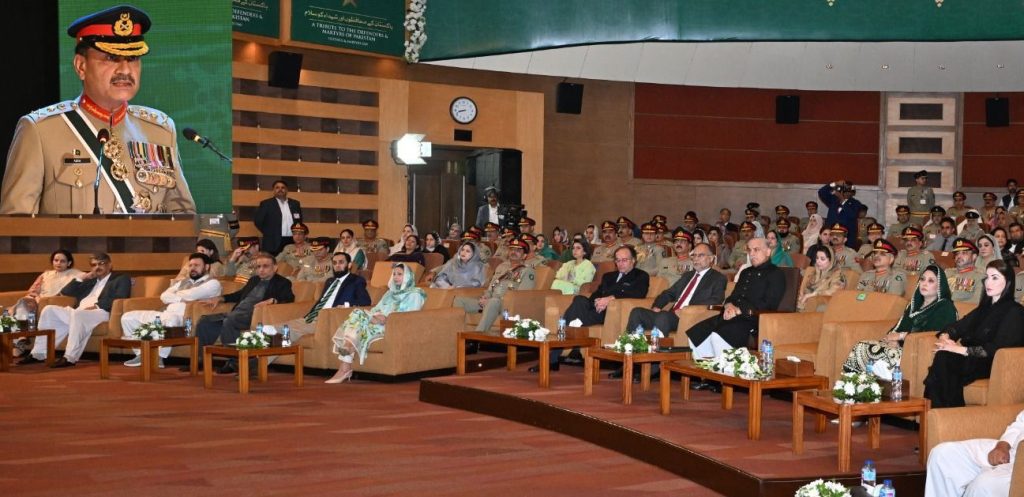RAWALPINDI: Pakistan’s Army Chief General Asim Munir has urged against turning political differences into hatred, saying that the nation will not allow “nefarious objectives” aimed at undermining national unity to succeed.
Speaking at the Defence and Martyrs Day ceremony at General Headquarters (GHQ) in Rawalpindi on Friday, Army Chief praised the sacrifices of martyrs, and said that their contributions have brought stability and bolstered national security.
“The bond between the armed forces and the nation is deeply rooted,” said the Chief of Army Staff (COAS). “The nation has consistently supported the army, whether during natural disasters, foreign hostilities, or the war against terrorism.”
He highlighted that the strong connection between the people and the military ensures the defeat of the country’s adversaries, and those who seek to create divisions between the army and the people will ultimately fail.
Regarding the newly launched Operation Azm-e-Istehkam, the COAS clarified that it is not a new counter-terrorism initiative but rather an extension of the National Action Plan (NAP), aimed at eradicating terrorism and extremism. He assured that the operation will not result in the displacement of civilians.
General Asim Munir said that the fight against militancy is ongoing and will persist until every last terrorist is eliminated from Pakistan’s soil. He praised the sacrifices of the armed forces, law enforcement agencies, and the people of Khyber Pakhtunkhwa and Balochistan, describing their contributions as a significant chapter in the nation’s history.
He also noted achievements such as the Paigham-e-Pakistan strategy against extremism, improved management of the western border, and the integration of tribal areas.
“The commitment to achieving stability is crucial for national security. We will overcome elements spreading despair and chaos through unity,” he declared.
Army Chief called for harmony and unity, urging the nation to demonstrate togetherness, tolerance, and respect for minority rights as enshrined in the Constitution of Pakistan. He cited Quaid-e-Azam’s principles of faith and unity as guiding lights for the nation.
The COAS acknowledged Pakistan’s geographical significance and its rich natural resources, emphasizing the crucial role of the youth in the country’s integrity and development.
Addressing the issue of Indian Illegally Occupied Jammu and Kashmir (IIOJK), he stated that it is not only a national but also a regional and global issue. “Sustainable peace in South Asia can only be achieved with the resolution of the Kashmir dispute,” he said. He said Pakistan will continue extending moral, diplomatic and political support to the people of Kashmir.
The ceremony commemorated the sacrifices of those who fell during the 1965 war, when Indian forces crossed the border to attack Pakistan. The conflict, which included attacks on border areas in Lahore, Sialkot, and Sindh, continued until a ceasefire was brokered by the United Nations on September 22, 1965.
Prime Minister Shehbaz Sharif, Punjab Chief Minister Maryam Nawaz, federal ministers, and other dignitaries were present at the ceremony.


